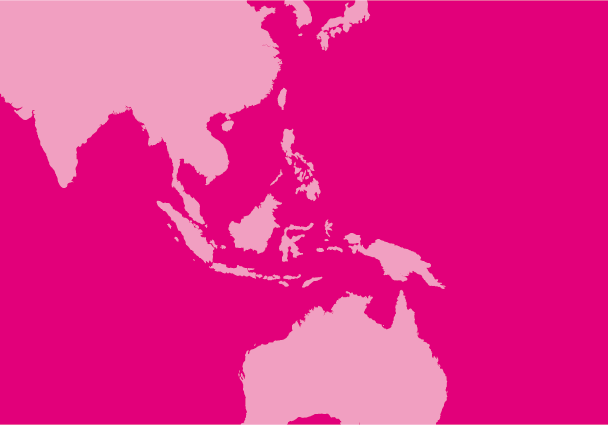
Mar 11, 2019 | Advocacy
The “Independent Commission of Enquiry” (ICOE) on Rakhine State, announced by the Government of Myanmar in May 2018 and established in July, has not demonstrated any reasonable prospect of meeting international standards of independence, impartiality or effectively contributing to justice or accountability for human rights violations constituting crimes under international law.
The ICOE is not transparent about how its information gathering will, if at all, shed light on the truth, or contribute to accountability and redress, while protecting individuals it comes into contact with. It is also yet to fulfill conditions called for by the UN Human Rights Council in its September 2018 resolution 39/2.
Any move to shift reference in the Council resolution currently under discussion, to include more positive recognition of the ICOE, would be wholly unjustified.
Furthermore, the government continues its unwillingness to address credible allegations of crimes under international law, including in its report to the CEDAW Committee in February in which rape allegations were dismissed as “wild claims.”
The International Commission of Jurists (ICJ), in response to a “Call for Submissions” on 12 December 2018, inviting “individuals, groups, witnesses and alleged victims to submit their complaints or accounts, with supporting data and evidence,” wrote to the ICOE Chairperson with four questions, summarised as:
- Are any measures in place to protect complainants and witnesses against threats of violence, legal action or other forms of reprisals for providing information to the ICOE? What specific measures have been taken to ensure the confidentiality of any materials submitted, and to protect the identities and wellbeing of witnesses?
- Given statements by commissioners that accountability is not part of their mandate, as the ICOE is seeking submissions of data and evidence from victims and witnesses, please clarify the ICOE’s position on how these submissions will be utilized – including for possible criminal investigations.
- Can you provide information on any measures taken to deal with real or perceived conflicts of interests that may affect the public’s trust in the ICOE’s impartiality and independence, including victims and witnesses and others who may submit materials in response to your call?
- The recommendations of past Commissions of Inquiry have not been fully implemented. Given the sensitive nature of the ICOE’s mandate, what considerations have been taken into account to increase the likelihood that recommendations will be more effectively implemented than in the past?
The ICOE did not respond to these questions, despite having formally acknowledged receipt of the letter. The deadline for public submissions to the ICOE has now passed. Its silence in this instance illustrates a broader failure to demonstrate independence or transparency and underlines protection concerns.
The ICJ is unaware of efforts by the ICOE to genuinely seek cooperation with the UN Independent International Fact Finding Mission or the Special Rapporteur on the situation of human rights in Myanmar, as has been called for by the Council.
Based on extensive experience and research in Myanmar and globally, and recalling a 5-page legal assessment of the ICOE published in September 2018, the ICJ remains of the view that the ICOE, like previous government-backed inquires, cannot effectively contribute to or deliver justice or accountability.
Myanmar-Inquiry Rakhine-Advocacy-2019-BUR (Burmese version, in PDF)
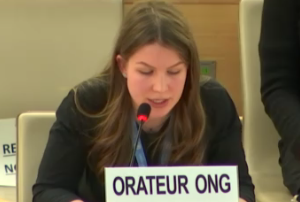
Mar 8, 2019 | Advocacy, Non-legal submissions
Speaking at the UN, the ICJ today urged all States from all regions to participate actively in the process towards a treaty on business and human rights.
The statement, delivered during a general debate on thematic issues at the UN Human Rights Council in Geneva, read as follows:
“Mr President,
The report on the Fourth session of the Intergovernmental Working Group to establish a legally binding instrument in the field of business and human rights opens opportunities for States and the international community to build a multilateral legal framework in this field.
We continue to urge all States from all regions – especially those that have been reluctant to engage- to actively participate in this process.
The ICJ considers that this draft should be based on transparent consultation and participation and respect standards of clarity and precision.
Recent dramatic events in Brazil and South Sudan show the central place that a system of legal responsibility for businesses, including for complicit participation in abuses, should have in an international treaty.
The dam collapse in the Brazilian locality of Brumadhino and the evidence pointing to oil industry complicity with serious human rights violations in South Sudan show the global scale of the problem and the involvement of companies from all corners of the world.
A treaty should also provide to all states a set of common standards effective collective action to guarantee access to justice in a transnational setting.
The creation of an international legally binding framework for States to maximize action and cooperation regarding human rights abuses in the context of business operations remains a compelling necessity of our times.
I thank you.”
The statement may be downloaded in PDF format here: HRC40-OralStatement-GDitem3-2019
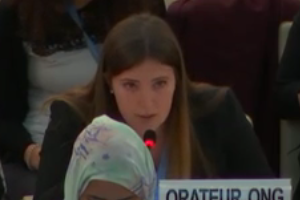
Mar 8, 2019 | Advocacy, Non-legal submissions
The ICJ today addressed the UN Human Rights Council on the need for a time-bound implementation plan, developed with the Office of the High Commissioner for Human Rights, for Sri Lanka to implement its commitments and obligations on transitional justice.
The statement, delivered during an interactive dialogue with the UN High Commissioner for Human Rights on her annual report, read as follows:
“Madame High Commissioner,
The International Commission of Jurists (ICJ) appreciates the efforts undertaken by the OHCHR in advancing transitional justice in Sri Lanka, mentioned in paragraph 69 of your report.
Any progress made by Sri Lanka, especially in relation to the implementation of transitional justice mechanisms under Resolution 30/1, albeit slow and wholly insufficient, has been primarily due to the continued engagement of the Council, OHCHR and international community. Therefore, keeping Sri Lanka on the agenda of the Council is paramount to ensure progress on all remaining commitments set out in Resolution 30/1.
As the Council is poised to provide Sri Lanka with an extension of two years to fulfill its commitments under Resolution 30/1, ICJ considers the expeditious development of a time-bound implementation plan with a deadline for delivery as essential. It is also pertinent that the implementation process is not a mere procedural exercise, but holistic and contextually appropriate.
At present, it appears that women are largely excluded from meaningfully participating in transitional justice processes, despite having been at the forefront in demanding truth and justice. Even mechanisms that have been put in place so far lack a comprehensive gender strategy. It is imperative that problems faced by women during and in the aftermath of the conflict are effectively identified and addressed in order to ensure that they are not left behind as the country seeks to move forward. The OHCHR with its expertise and experience in the field is well-placed to provide the necessary advice and technical assistance, especially in relation to matters that often get ignored or marginalized.
Madam High Commissioner, how would you see OHCHR fulfilling its role in relation to the development of the time-bound implementation plan and the due accomplishment of all remaining commitments made under Resolution 30/1?”
The statement can be downloaded in PDF format here: HRC40-OralStatement-IDwHCitem2-2019
The oral statement follows a joint open letter from NGOs, calling for such a plan, here.
The ICJ earlier submitted a written statement on Sri Lanka, available here.
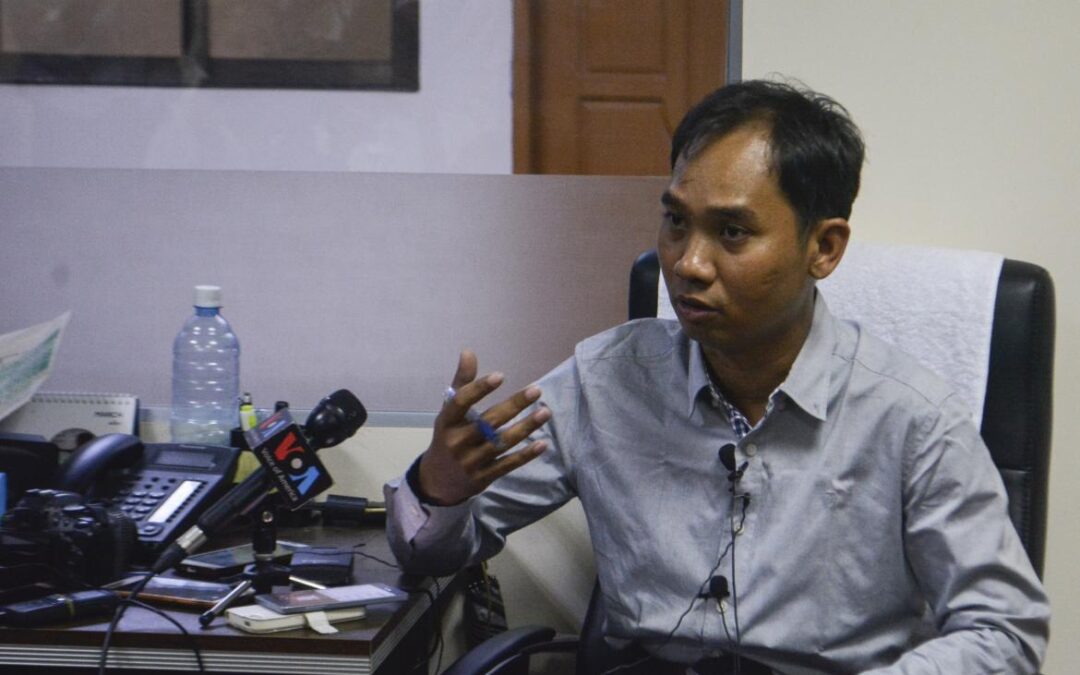
Mar 7, 2019 | Advocacy, News
The ICJ joined a list of 77 civil society organizations to call on relevant authorities in Myanmar to drop spurious charges against journalist Ko Swe Win, to decriminalize defamation, and to release human rights defenders currently imprisoned under repressive criminal defamation laws.
The statement reads:
On the second anniversary of the defamation charges brought upon Ko Swe Win, editor at online newspaper Myanmar Now, we, the undersigned 77 civil society organisations, call on the relevant authorities to drop the case against him. Spurious defamation charges under Article 66(d) of the Telecommunications Law were filed against him on 7 March 2017 by ultranationalists intent on suppressing free speech. The Government of Myanmar must take concrete steps in parliament to decriminalise defamation, repeal Article 66(d) of the Telecommunications Law and drop the charges and release all activists and human rights defenders currently in prison and being charged under this repressive legislation.
Article 66(d) of the Telecommunications Law of 2013 was amended in 2017, but notably, defamation is still criminalised and carries a punishment of up to two years of imprisonment or a fine of up to one million kyat or both. The law is still frequently used to stifle free speech in Myanmar and silence critics. To date, a reported 173 cases have been filed under Article 66(d) since its enactment.
The UN Human Rights Committee has called on all states to decriminalise defamation, indicating that imprisonment for defamation is a penalty that can never be appropriate or compatible with the right to freedom of expression. In addition, the Special Rapporteur on the promotion and protection of the right to freedom of opinion and expression has stated that defamation should be treated as a matter of civil rather than criminal law, stressing that criminal prosecution for defamation inevitably becomes a mechanism of political censorship, which contradicts freedom of expression and of the press. In the case of Article 66(d), Myanmar law allows for agents of the offended party to file charges for defamation and initiate criminal proceedings on their behalf. In effect, this means that powerful organisations and individuals can operate via proxies to target those that they consider disturbing, a form of judicial harassment with severe implications for the individuals who are accused.
Ko Swe Win was charged with defamation under Article 66(d) of the Telecommunications Law for sharing a story by Myanmar Now on Facebook. The story quoted a senior monk who said that well-known ultranationalist monk U Wirathu’s actions could be cause for him to be expelled from the monkhood as they violated the tenets of Buddhism. U Wirathu, notorious for using Facebook to agitate against Muslims, had previously expressed support for and thanked U Kyi Lin – the recently convicted gunman who shot and killed prominent lawyer U Ko Ni in January 2017. U Ko Ni was an expert on constitutional law and was working to change the military-drafted 2008 Constitution. The plaintiff, a follower of U Wirathu, brought the charges in March 2017 and the court proceedings started in July 2017.
Since then, Ko Swe Win has had to travel regularly to the courthouse in Mandalay, where the charge was filed, from his home in Yangon and back – a distance of over 1,200 kilometres. The court hearings, now totaling 55, have been ongoing for almost two years, but the court has still only heard the plaintiff’s side, which has consistently been stalling the process. On some occasions, Ko Swe Win has travelled from Yangon only to find that the plaintiff or witnesses have failed to appear in court and that the proceedings have been postponed. The plaintiff himself was arrested in August 2017 and has since been detained, which has caused significant delays to the process.
U Wirathu has been summoned twice but failed to appear. On the first occasion, his lawyer informed the court that U Wirathu could not make the hearing because he was attending a donation ceremony. On the second occasion, U Wirathu’s lawyer requested that the hearing be held at his monastery compound. That request was denied by the township court, but U Wirathu appealed to the higher district court, which also denied the request. While the district court considered the request, no hearings could be held in the township court. Ko Swe Win however, was still required to make an appearance every two weeks before the township court judge just to be informed of the next date he was due to appear in court. This procedure, which required him to travel from Yangon to Mandalay, was typically over in a matter of minutes.
The many irregularities of this case highlight the lack of independence of the Myanmar judiciary. It appears that the authorities are determined to target those that are working to expose troubling truths and terrible crimes, rather than those who commit them. Those responsible for spreading dangerous speech and inciting violence face no consequences, while those who criticise such dangerous actions continue to be prosecuted. In a recent parallel case, also fraught with controversies, two Reuters reporters – Wa Lone and Kyaw Soe Oo – were convicted to seven years in prison for exposing a mass killing of Rohingya men and boys carried out by the Myanmar military in northern Rakhine State.
In Myanmar, high-ranking military commanders, some of whom are accused by UN investigators for war crimes, crimes against humanity, and even genocide, remain at large, while journalists who expose the truth and report on human rights violations in the country are charged under repressive laws. This inverted idea of justice needs to come to an end if Myanmar is to continue its path towards democracy.
As long as Article 66(d) remains, people in Myanmar, especially those who criticise powerful individuals, officials and government policies online, will be at risk of being imprisoned for their peaceful exercise of the right to freedom of expression.
In light of the above, we call on the Government of Myanmar and its relevant authorities to:
- Drop the defamation charges under Article 66(d) of the Telecommunications Law against Ko Swe Win and other activists and human rights defenders and release those currently imprisoned under this repressive legislation;
- Repeal Article 66(d) of the Telecommunications Law, or at a very minimum, amend it to ensure that:
- defamation is no longer criminalised by deleting references to “defamation” as well as vague language such as “disturbing”;
- only a government prosecutor can file a criminal complaint under Article 66(d);
- where recognisably criminal acts such as “extortion” and “threats” occur in the law they are clearly and narrowly defined in line with international human rights law, to ensure it is not used to criminalise the peaceful expression of views.
Download
Myanmar-statement on defamation-Advocacy-2019-ENG (full statement in English, PDF)
Myanmar-statement on defamation-Advocacy-2019-BUR (full statement in Burmese, PDF)
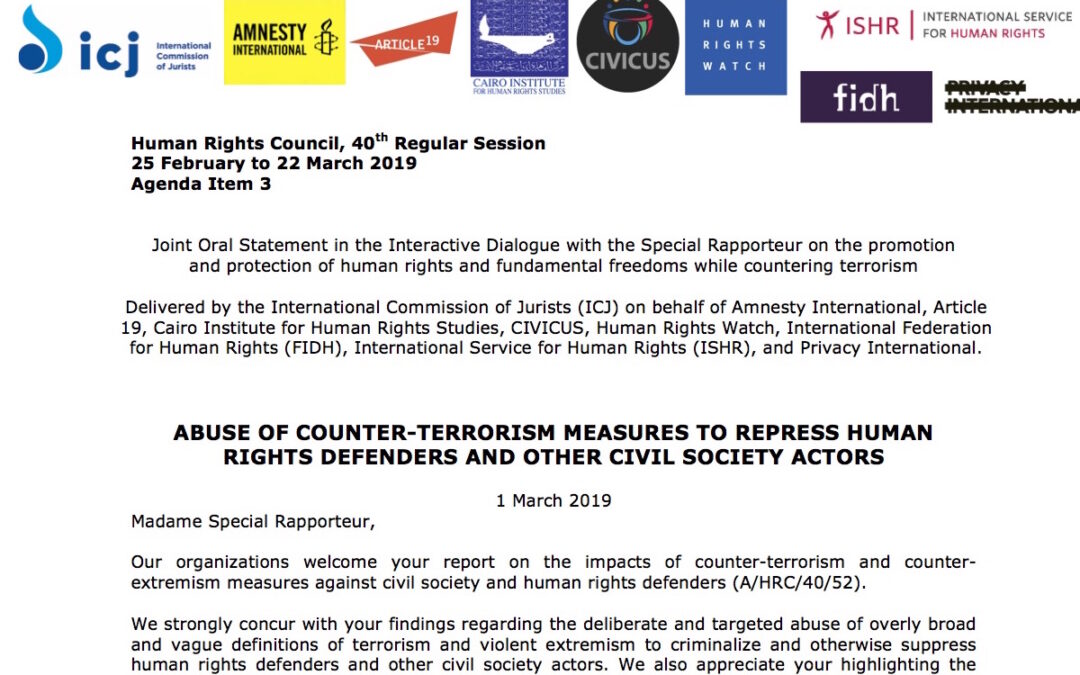
Mar 1, 2019 | Advocacy, Non-legal submissions
The ICJ today delivered a joint oral statement to the UN Human Rights Council, addressing the abuse of counter-terrorism measures to repress human rights defenders and other civil society actors, and highlighting deep concerns about possible moves to allow Egypt a significant role over the UN’s independent expert on human rights and counter-terrorism.
The statement was delivered in an interactive dialogue with the UN Special Rapporteur on the promotion and protection of human rights and fundamental freedoms while countering terrorism. The ICJ made the statement jointly on behalf of Amnesty International, Article 19, Cairo Institute for Human Rights Studies, CIVICUS, Human Rights Watch, International Federation for Human Rights (FIDH), International Service for Human Rights (ISHR), and Privacy International.
The organisations had earlier sent a joint letter to all States’ delegations to the Council in Geneva, highlighting Egypts appalling record of abuse of counter-terrorism measures, and urging States to strongly oppose any attempts to weaken the mandate of the Special Rapporteur, whether by diluting or distorting it by importing the flawed Egyptian-led approach into the Mexican-led resolution for its renewal, or any moves by longstanding leader Mexico to share co-leadership of the mandate renewal resolution with Egypt or other States with such an appalling record in relation to the very issues the mandate is to address.
The joint oral statement to the Council read as follows (check against delivery):
“Madame Special Rapporteur,
Our organizations welcome your report on the impacts of counter-terrorism and counter-extremism measures against civil society and human rights defenders (A/HRC/40/52).
We strongly concur with your findings regarding the deliberate and targeted abuse of overly broad and vague definitions of terrorism and violent extremism to criminalize and otherwise suppress human rights defenders and other civil society actors. We also appreciate your highlighting the need to prevent indirect impacts on civil society.
Among those States with a particularly appalling record of deliberate and targeted abuse, Egypt, which is mentioned in your report (paras 53 and 56), is a prominent example. As Human Rights Watch recently stated: “Using counterterrorism as a guise to crush all forms of dissent could be Egypt’s hallmark of 2018… There’s simply not much room left to peacefully challenge the government without being detained and unfairly prosecuted as a ‘terrorist’.”[1] Other examples from the reports before the Council include Turkey (para 53), Saudi Arabia (A/HRC/40/52/Add.2 paras 21-29), and China particularly as regards Uyghurs and Kazakhs (paras 55 and 57).
We share your concern about the elements lost from the previous Human Rights Council and General Assembly resolutions on “protection of human rights and fundamental freedoms while countering terrorism” in their March 2018 merger with the deeply flawed Egyptian-led initiative on “effects of terrorism” (para 29). We reiterate our call from March 2018 for future versions of the resolution to address the relevant issues exclusively and comprehensively from the perspective of the effective protection of human rights.[2] We strongly oppose any attempts to dilute your mandate, including by importing the flawed Egyptian-led approach into the resolution for its renewal, or any sharing of co-leadership of the mandate renewal resolution with States that have such an appalling record in relation to the very issues the mandate is to address.
Madame Rapporteur, beyond the particular cases mentioned in your report (para 53), what are your views on the broader situation within Egypt in terms of abuse of counter-terrorism measures and what can States, the United Nations, civil society, and other stakeholders do to stop such abuses in the name of counter-terrorism in Egypt and other egregious situations?
Thank you.
[1] https://www.hrw.org/news/2019/01/17/egypt-new-moves-crush-dissent (17 January 2019). See also among others: Human Rights Watch World Report 2019, https://www.hrw.org/world-report/2019/country-chapters/egypt; EuroMed Rights, Egypt – Finding Scapegoats: Crackdown on Human Rights Defenders and Freedoms in the Name of Counter-terrorism and Security (Feb 2018) https://euromedrights.org/wp-content/uploads/2018/03/EuroMed-Rights-Report-on-Counter-terrorism-and-Human-Rights.pdf; Joint NGO Statement, Egypt: Civil society faces existential threat (23 June 2016) https://www.icj.org/wp-content/uploads/2016/06/Egypt-Advocacy-JointNGOStatement-2016.pdf.
[2] Joint NGO end-of-session statement (23 March 2018) https://www.icj.org/hrc37-endofsession/.”
The statement can be downloaded in PDF format here: HRC40-JointOralStatement-SRCTHR-2019-EN
For more information email un(a)icj.org.
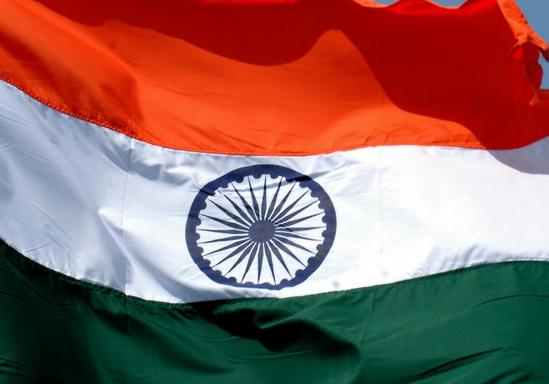
Feb 28, 2019 | Advocacy, News
The ICJ made a submission to Mr. Léo Heller, the United Nations Special Rapporteur (Special Rapporteur) on the human rights to water and sanitation, in response to a call for submission in advance of the Special Rapporteur’s 2019 Human Rights Council Report on the human rights to water and sanitation in spheres of life beyond the households, in particular in public spaces.
The ICJ’s submission focuses on the status and the impact of inadequate access to water and sanitation on lesbian, gay, bisexual, transgender and queer individuals (LGBTQ), and more specifically on transgender persons and non-binary persons, in India.
ICJ’s submission draws on its ongoing work on the human rights of LGBTQ persons in India, where from 2017 to date, the ICJ has studied LGBTQ persons’ access to and enjoyment of economic, social, and cultural rights, focusing on access to adequate housing, decent work, and public spaces and services including water and sanitation. The goal is to reveal, address, and reduce discriminatory treatment against LBGTQ persons in accessing economic, social and cultural rights as a result of discriminatory laws and practice through advocacy with the Indian State and with the United Nations.
Read the full submission here.










